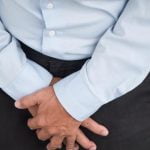Research from Mintel reveals that a whopping 86% of all British adults have suffered some form of gastrointestinal problem or ailment in the last year. There are many different conditions and aliments that can cause abdominal pain so it can be difficult to know what is wrong.
Family GP Dr Roger Henderson helps decipher seven types of tummy pain, their symptoms and as well as advice on how to ease any troubles…
Causes: The cramping pain and discomfort of IBS is caused by muscle spasms in the bowel. Experts don’t know exactly why the condition develops, although they do agree that there are some things that can trigger symptoms and make them worse. Triggers for IBS vary between individuals but stress, dietary factors and some medicines are the common triggers, often in combination.
Family GP Dr Roger Henderson says:
“IBS is a painful long-term condition which can have a big impact on day-to-day life. It’s important to understand your triggers and how to deal with a flare-up so you can manage symptoms effectively.”
- For some people eating smaller, more frequent meals can help as well as limiting your intake of alcohol, caffeine and foods high in fat
- Exercising for at least 20 minutes a day will not only help to keep your stress levels down but also keep the bowels moving normally
- It’s also advisable to have an over-the counter remedy such as an antispasmodic to hand just in case symptoms become particularly painful
- Antispasmodics, like Buscopan IBS Relief, can be taken at the first sign of a flare up and quickly work to ease spasms in the intestines at the root cause of pain – other painkillers are less effective at targeting this type of pain
2. Trapped wind
Symptoms: The typical symptoms of trapped wind in the bowels include stomach cramps, burping, bloating, flatulence, nausea, vomiting and pain when bending over, lying down or with physical exercise.
Causes: It is normal to have gas in your intestine and we all produce several litres of gas a day through the normal processes of digestion. Some of this is reabsorbed into the bloodstream and eventually breathed out, with the remainder being expelled as wind. One possible cause of excess gas may be swallowing too much air when eating, drinking or talking. Certain foods and fizzy drinks can also contribute to this. Smoking can also make you swallow more air and some people also swallow air as a nervous reaction.
Excess gas can also be caused by bacteria in the colon producing too much gas when they break down food. Foods containing complex carbohydrates, for example vegetables such as beans, cabbages and Brussels sprouts, are difficult for the human body to digest and are broken down by gas-producing bacteria instead. Foods that contain sorbitol, an artificial sweetener, can lead to similar problems.
Family GP Dr Roger Henderson says:
- Cut down on foods known to cause wind and bloating such as beans, onions, broccoli, cabbage, sprouts and cauliflower but make sure you still eat five portions of fruit and vegetables a day
- Try avoiding high fat foods and eggs as these can produce bad smelling gas as well as refined and sugary foods, especially those containing the artificial sweetener sorbitol
- Keep hot spicy food to a minimum, particularly if you are not used to it
- Try not to swallow too much air
- Don’t talk and eat at the same time, sit down to eat (sitting upright and not slumped over), stop chewing gum and chew with your mouth closed
- You should also try to reduce the amount of fizzy drinks you consume and avoid drinking from a straw as this can make you swallow air
- You should also avoid sitting for long periods
- If you’re sitting at work, take regular breaks (at least every hour) to stretch the legs and abdomen
- Try to take regular exercise to help improve your digestion, for example, it may help to go for a short walk after eating in order to move gas around
- Gently, but firmly, massage the abdomen from right to left to release any trapped wind
3. Constipation
Symptoms: The symptoms of constipation are infrequent bowel movements, hard, dry stools, difficulty or pain when defecating and swelling of the abdomen.
Causes: The cause of constipation can be down to diet. Not eating enough fibre such as fruit and vegetables and not drinking enough water can contribute to the condition. With a change in lifestyle, often comes a change in eating habits, which may be causing problems. Certain medications can have side effects which include constipation and it can also be a result of anxiety or depression.





